Investment in early years is key to ending inequality and poverty
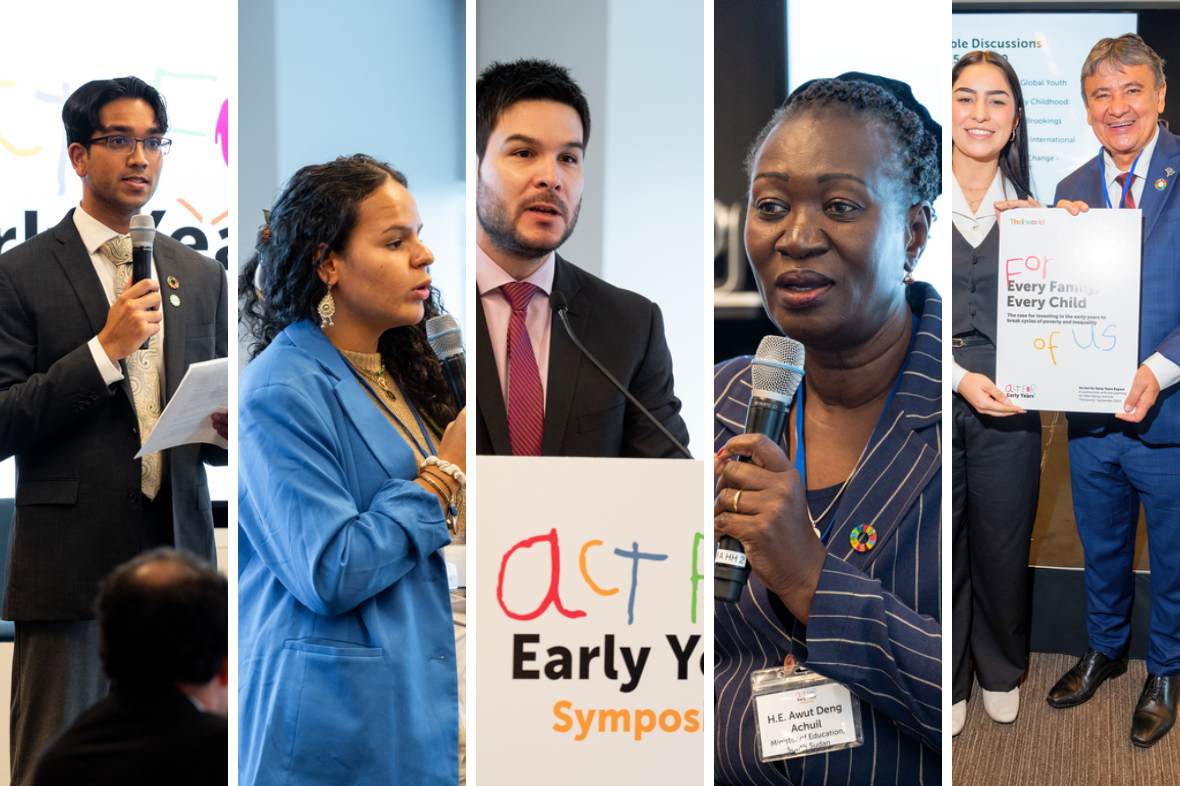
Business leaders and other experts attending the Act For Early Years Symposium heard that increased funding for the youngest children, including through childcare and preschool, is crucial to meet the Sustainable Development Goals.
Investment in the early years of children’s lives must be right at the heart of global efforts to tackle inequality and poverty.
Ensuring every child has access to quality care and early childhood education is fundamental to achieving every one of the Sustainable Development Goals – from ending hunger to economic growth and climate action.
That was the message which rang loud and clear today at the Act For Early Years Symposium, held in New York during the United Nations General Assembly and the Summit of the Future. It brought together experts from a wide range of specialities, including climate, gender and business, as well as government ministers, youth activists and celebrities.
The event featured two major announcements:
- Brazil’s Minister of Social Development, Wellington Dias, revealed that the new Global Alliance Against Hunger and Poverty, being launched at the G20 summit in Rio de Janeiro November, will prioritise early childhood.
- The new CEO of the International Finance Facility for Education, Karthik Krishnan, committed to ensure that early childhood education gets a fair share of funding.
The event was hosted by the Global Business Coalition for Education’s partner organization Theirworld, in collaboration with UNICEF, Sesame Workshop, Early Childhood Deveopment Action Network (ECDAN) and the Brookings Institution’s Center for Universal Education.
Through the Act For Early Years campaign, the Global Business Coalition for Education and Theirworld are aiming to mobilize $1 billion in new commitments from the public and private sectors over the next three years to support early years care and education.
Everyone attending the event was given a copy of the world’s tiniest campaign ‘Minifesto’ – a document small in size but vast in ambition. Launched this week as part of the Act For Early Years campaign, it is crafted in the style of children’s drawings and makes an urgent case for investment in early childhood. The ‘Minifesto’ stands in stark contrast to the lengthy policy papers that often dominate international forums.
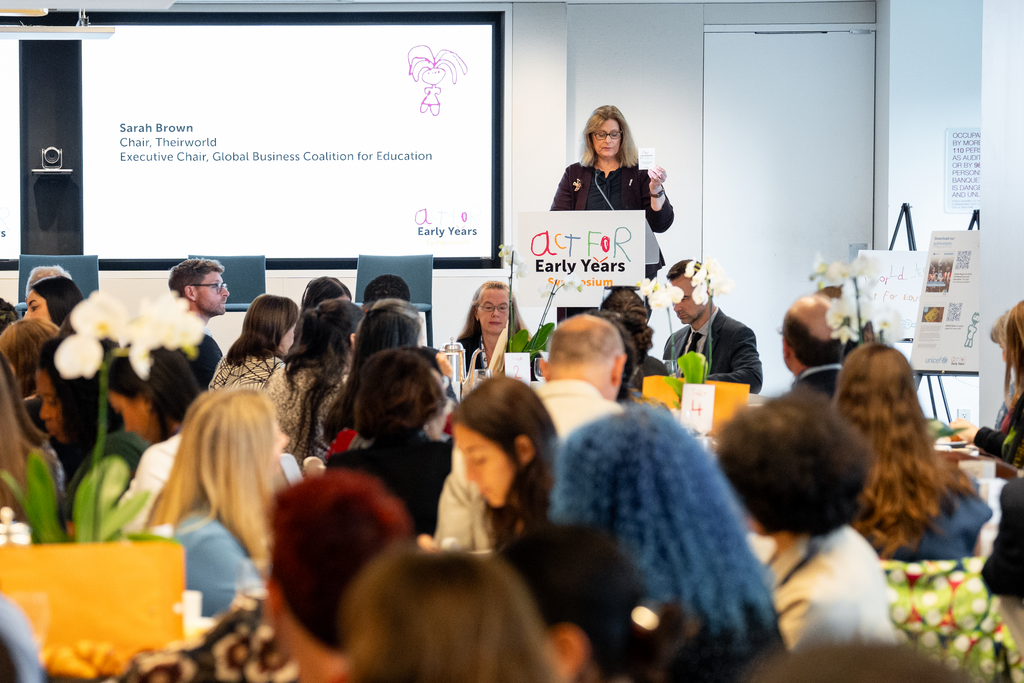
Sarah Brown, Executive Chair of the Global Business Coalition for Education, addresses the symposium (Theirworld/Ilya Savenok)
In her opening remarks, Sarah Brown, Executive Chair of the Global Business Coalition for Education, said: “Inequality takes root in the first five years. If we don’t act now we perpetuate cycles in inequality and poverty. But we know what works – investing in early childhood brings the greatest returns – not just for children but for society as a whole.
“Our Minifesto is focused on one transformative goal – for every child to get the best start in life. Together we can make ECD a global priority.”
Learn more about the ‘Minifesto’
Sarah introduced two of Theirworld’s Global Youth Ambassadors – Lilia Touil, 24, from France, and Akul Gupta, 21, from USA.
Lilia said: “Early years education is not just about knowledge – it’s about giving every child the freedom and the power to choose their future. By investing in early childhood we give every child the chance to dream.” Akul said: “We have a collective responsibility for our youngest children and ensuring their ability to thrive.”
The symposium heard that investing in early years is not just a moral win – it must also be a major strategic objective in tackling inequality and achieving the Sustainable Development Goals. And it’s also a crucial part of the response to any humanitarian emergency, such as conflicts, climate crises and natural disasters.
That was demonstrated by international development and education expert Maysa Jalbout when she spoke about the current crisis in Gaza. Maysa, Senior Adviser on Education in Emergencies for Theirworld, is the author of a forthcoming Theirworld report, Early Childhood Development in Gaza: A Call to Action.
It will shed light on the most critical challenges facing young children aged up to five; highlight the urgent needs in health, nutrition, education, and protection; and call for the inclusion of a comprehensive early childhood development plan as part of post-ceasefire recovery efforts.
Maysa outlined the terrible toll for children in Gaza – including more than 10,000 killed and 20,000 orphaned or separated from their families. Another 2,000 children under five have lost limbs.
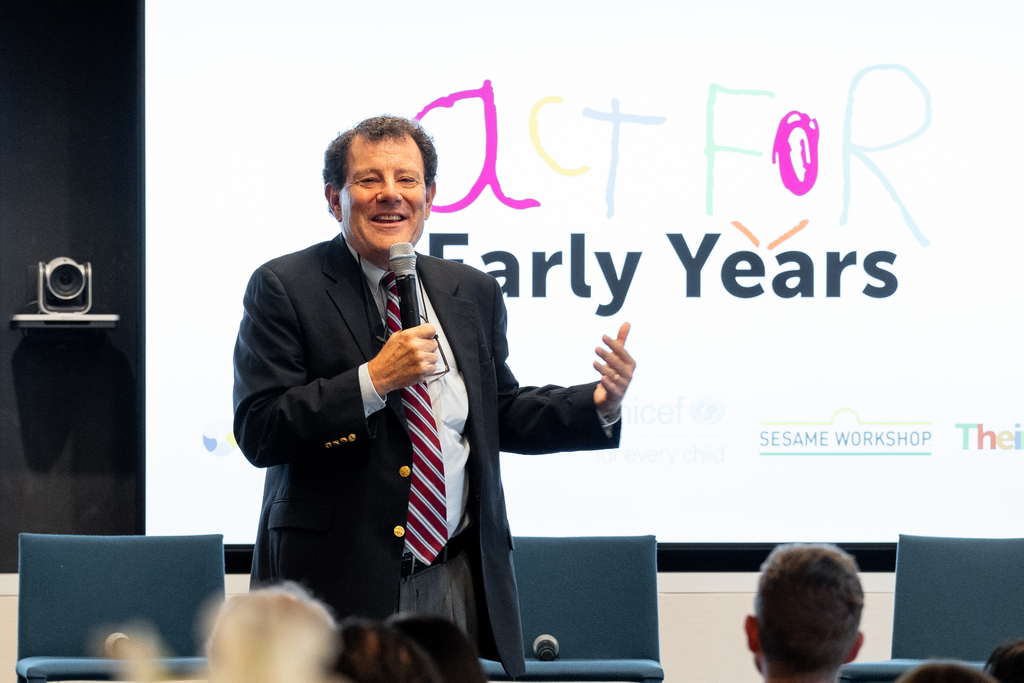
New York Times columnist Nicholas Kristof is a passionate believer in early childhood education (Theirworld/Ilya Savenok)
She added: “We are forming a coalition of organisations that will be ready as soon as there is a ceasefire with an initiative for the youngest children in Gaza. We want to create a network of early childhood centres.”
Another announcement came from Sweta Shah, an expert on global economy and development at the Brookings Institution’s Center for Universal Education. She revealed the launch by the Brookings Institution and Theirworld of a new data hub to provide advocates and experts with the latest evidence they need for action on early childhood.
After the opening remarks, Sarah Brown introduced keynote speaker Nicholas Kristof, opinion columnist for the New York Times. He told how his reporting from around the world led him to begin to understand the issues around early childhood.
Talking about his own childhood in Oregon, he said: “So many kids who I grew up with were traumatized early on and had no investment in them until they arrived at school at six. So much of the damage had been done.
“I have become a passionate believer in early childhood development as a high-return investment. There is no investment that generates a higher return than this. We need to emphasize that if we don’t invest at the front end, you end up paying at the back end.
“Fundamentally, this notion of vulnerable kids who we can help, whose future rests in our hands, that a country cannot prosper and thrive if we leave so many behind – that has to have resonance. It’s not just about empowering individual children, it’s about empowering a whole country.”
Walter Gutiérrez, Minister of Childhood and Adolescence for Paraguay, spoke about the early childhood actions taken by his country, led by President Santiago Peña and First Lady Leticia Ocampos. They include 100 early childhood care centers with a community-based focus on development, a growing school feeding program and collaboration with health centres on children’s physical and emotional wellbeing.
He said: “We intend to be an inspiring model. Paraguay is a nation that truly strives to transform the fortunes of its citizens from the early years. Care, health and education in the early years are fundamental not just for children but for the whole country.”
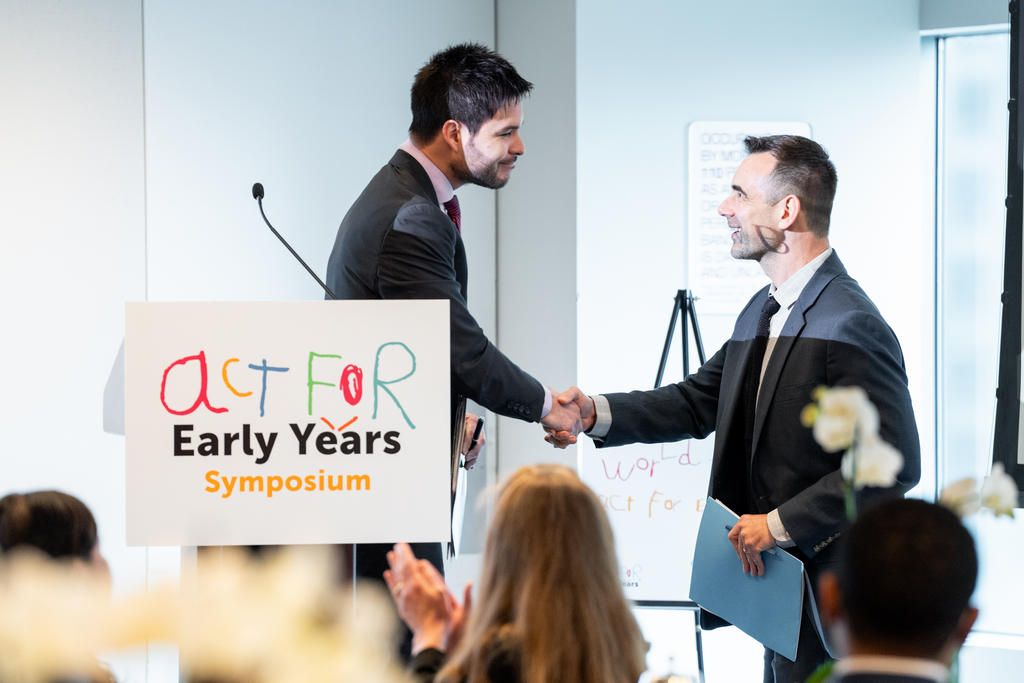
Walter Gutiérrez, Minister of Childhood and Adolescence for Paraguay, with Theirworld President Justin van Fleet (Theirworld/Ilya Savenok)
Another keynote address was given by Wellington Dias, Brazil’s Minister of Social Development. He is leading the new G20 initiative from Brazilian President Luiz Inacio Lula da Silva called the Global Alliance Against Hunger and Poverty.
Setting the scene, he said: “This is an urgent and critical matter. Child hunger and poverty around the world are at their worst levels for generations – we cannot accept this. There are multiple crises, but it is time to stop talking about the complexity and move to action.”
He talked about Brazil’s combination of policies and programmes, which cover areas such as health, school meals and childcare, adding: “We created a specific benefit for early childhood which helps more than nine million children up to six. We know we are on the right track.”
He said Brazil had developed a series of policies that will serve as reference for the Global Alliance Against Hunger and Poverty, adding: “We made it a point to include in this combination a series of programmes and policies targeting early childhood – including primary care, childcare in poor communities, cash transfers targeted at early childhood and other care programmes.
“We also want to take note of the Act For Early Years campaign and the open letter sent to the G20 by organisations that are fighting for better conditions for early childhood, including organisations represented here today.
“The Brazilian presidency of G20 is committed to talking to donors, financial institutions and national governments so that we can mobilise new partnerships, ideas and actions even before the formal launch of the Global Alliance at the G20 summit in November. If we move forward together, the Alliance will be the best legacy we can leave for future generations.”
The event also featured two panel discussions, each with a specific theme. The first focused on Investing in Early Years in Emergency, Conflict and Crisis Contexts. Moderated by Sidsel Marie Kristensen, CEO of The LEGO Foundation, it addressed the unique challenges of ensuring all young children receive the support they need in such contexts.
The panel featured Maysa Jalbout, Global Youth Ambassador Andressa Reis; Saima Wazed, South East Asian regional director for the World Health Organization; and Awut Deng Achuil, Education Minister for South Sudan, who talked about her own experience during the country’s conflict and “the wounds in the heart of children”.
She added: “Investing in early childhood is key if we want to have a stable future and peaceful communities. It is important for us as governments, parents and communities. It helps to change behaviours and embrace diversity. Without this solid ground, the house will be very shaky.”
Saima Wazed said: “During any crisis situation, the younger children are fundamentally impacted. They lose their family, their peers, their healthcare. They cannot vocalize what they need. Everything they need to thrive is gone. The traumatic experiences affect them in later life.
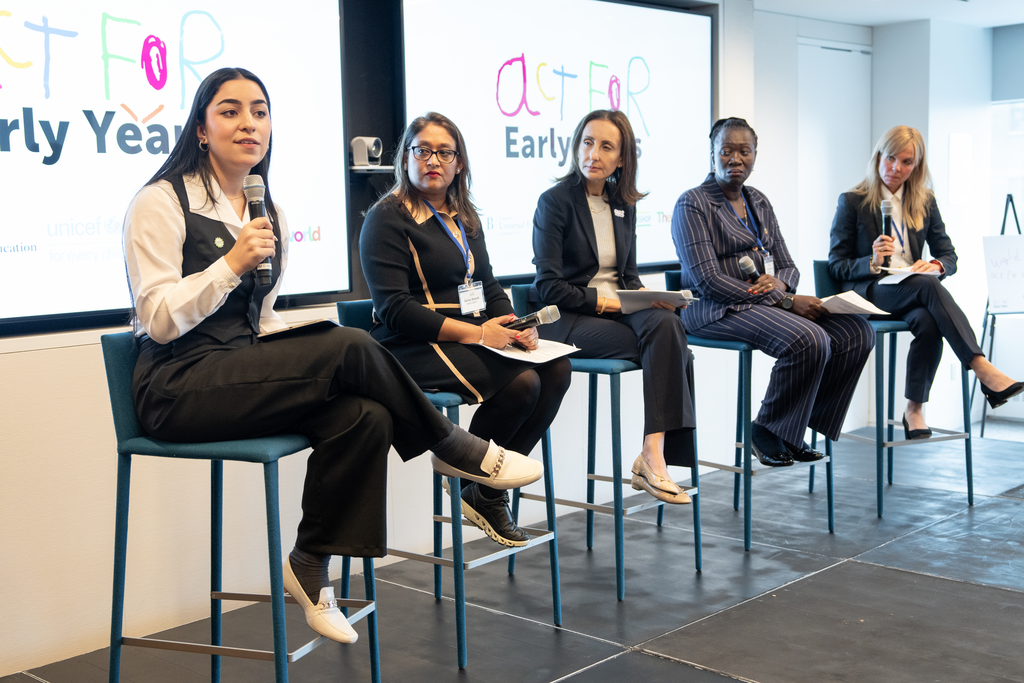
A panel discussion featured (left to right) Andressa Reis, Saima Wazed, Maysa Jalbout, Awut Deng Achuil and moderator Sidsel Marie Kristensen (Theirworld/Ilya Savenok)
“If we create health systems that are easily accessible, if we create greater information dissemination to families, it is easier to recuperate later on.”
Andressa, a 21-year-old climate and early childhood activist from Brazil, told how she evacuated her home aged six because of flooding. She added: “10 million children are being affected by floods again that are disrupting communities. The young children cannot understand what is happening.
“Children don’t just bounce back. I still live with fears. The effects can last a lifetime. So we must invest in the early years. Children must be our priority.”
The second session discussed Catalysing Early Years Investment. It was moderated by Joan Lombardi, CEO of Early Opportunities, and the panel featured Karthik Krishnan, CEO of the International Finance Facility for Education (IFFEd); and Angela Zhong, a Global Youth Ambassador from the United States.
Karthik Krishnan talked about the mechanics of the International Finance Facility for Education. saying: “We have to bring in additional money to the ecosystem. This money needs to cover early childhood education, primary, secondary, tertiary and upskilling and reskilling later.
“Early childhood education is one of the places where we get the most for our money. The early years is where we can have the biggest impact. What we need to focus on is how to use this golden opportunity to invest in young children.
“Our commitment should be to say how do we invest at least 10% of all of our funding in early childhood education to have the most impact. If we can help them get off to a great start, we have to spend less later.”
Angela Zhong spoke passionately about the urgent need for a multi-sectoral approach to the early years. She was loudly applauded when she said: “One of the issues that young activists face are constraints including a lack of engagement in political processes until you’re 18.
“And then our voices are dismissed when we are in that space. It’s almost like they see past us, not a willingness to partner with young people.”
She called for all organizations to listen to the voices of young people and take on board their ideas, skills and enthusiasm – with everyone working together to Act For Early Years.
